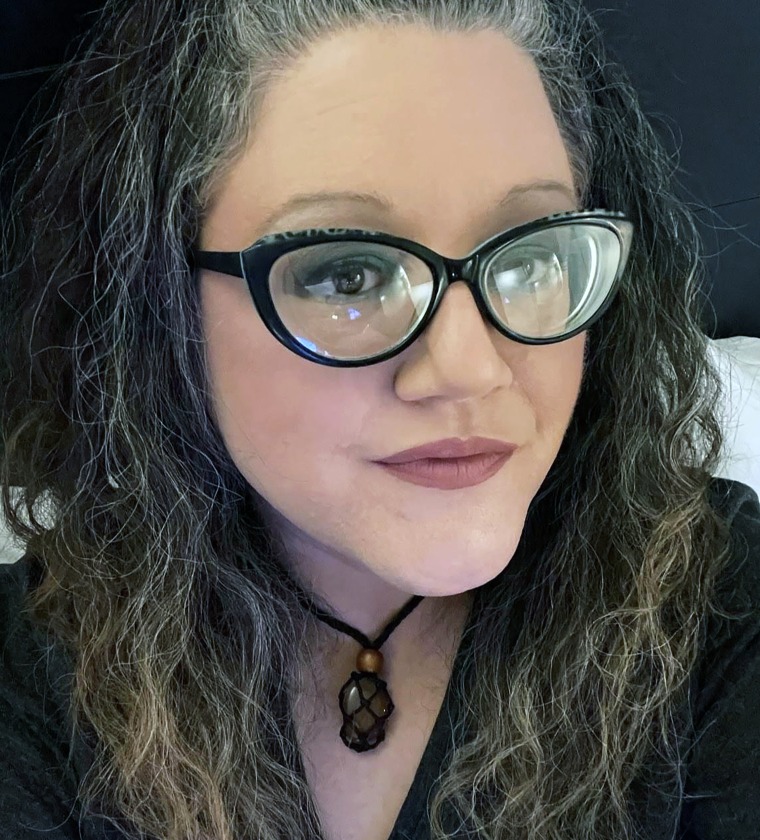Every morning, Jeni Gutke swallows 12 pills. In the evening, she takes 15 more, then another before bed. She also takes an injectable medication once weekly, and two other medications as needed.
Gutke, of Joliet, Illinois, has polycystic ovary syndrome, or PCOS, and the medications and supplements help the 45-year-old cope with migraines, high blood pressure, diabetes, high cholesterol, anxiety and depression that come with the complex hormonal condition.
Not one of Gutke’s medications are technically “PCOS drugs.”

The Food and Drug Administration has not approved a medication specifically for PCOS, which is often linked to infertility, irregular or missed periods, weight problems, and other debilitating symptoms. Gutke’s array of medications is typical of how many of the estimated 5 million women in the U.S. diagnosed with PCOS deal with it.
“It’s such a vast syndrome that affects everything from your head to your toes,” she said. She was diagnosed with endometrial cancer — another risk linked to PCOS — at age 37.
After nearly a century of disagreements over what, exactly, defines the condition, as well as a lack of research, PCOS is still poorly understood. The symptoms vary so widely that any single drug would be unlikely to help all patients, said Dr. Heather Huddleston, a reproductive endocrinologist at the University of California, San Francisco and director of UCSF’s PCOS Clinic.
Women with PCOS and the doctors who care for them say they want better options — treatments for the condition’s root causes rather than bandages for individual symptoms. Even as calls for better treatments grow, the lack of investment in PCOS research has limited doctors’ ability to help their patients.
“It gets very messy to try to identify one treatment that’s going to work for everybody,” Huddleston said.
Many women with the condition end up taking off-label prescriptions — meaning drugs technically approved for other conditions, like diabetes or obesity — to help PCOS-related symptoms. Navigating insurance coverage for off-label prescriptions can be challenging.
“There’s no magic pill,” said Tallene Hacatoryan, 31, a registered dietician from Orange County, California. “There are too many components for there to be a one-size-fits-all treatment.”

Hacatoryan was diagnosed with PCOS at age 18 and now works as a diet and lifestyle coach for women with PCOS.
Although research is murky when it comes to the best diet for women with PCOS, the most up-to-date international guidelines recommend exercise and a healthy diet. There’s no evidence that any particular diet improves symptoms, although some women have found lifestyle coaching helpful.
Insufficient funding for research
Among the reported 315 medical conditions that receive federal support from the National Institutes of Health, PCOS ranks near the bottom, with an estimated $10 million earmarked for research in 2024. Until 2022, PCOS was so underfunded that it wasn’t included as a line item in the NIH list. And the condition is not explicitly included in the $100 million the Department of Health and Human Services announced recently to research neglected areas of women’s health. Neither is PCOS mentioned in President Joe Biden’s recent executive order to advance women’s health, which includes $200 million for NIH research grants, or the White House’s calls for Congress to allocate $12 billion to fund women’s health research.
A spokesperson at the NIH said that it’s too early to know which women’s health conditions will receive funding under the new initiative.
“Given how common PCOS is, the amount of funding it’s gotten is proportionately extremely small,” Huddleston said.
Government funding is just one part of the total research budget for a given disease. While it’s tough to pin down a dollar figure for private industry spending, experts say the lack of FDA-approved PCOS treatments reflects a lack of investment from drugmakers, too.
Developing PCOS treatments requires a better understanding of the condition. This, in turn, requires far more research tracking thousands of women over many years, which can be extremely expensive, experts say.
However, there are some promising signs.
Although research is early and only in a few dozen women, there are a handful of small drug companies studying possible PCOS treatments. A Menlo Park, California-based company called May Health, for instance, is developing a one-time surgical procedure it thinks could help with PCOS. Spruce Bio, a San Francisco biotech firm, is running a small clinical trial with a drug called tildacerfont for PCOS. It is not clear yet if the oral drug works. President and CFO Samir Gharib said larger clinical trials will depend on the company’s ability to “secure additional financing” or partner with another drug company.
More women’s health news
The FDA recently attended a meeting with advocacy group PCOS Challenge where women shared their experiences with the agency’s scientists and drug companies. No PCOS drug trials were announced after the meeting, but the FDA’s interest shows a growing push for improved treatment, said William Patterson, a spokesperson for PCOS Challenge.
No known cure for PCOS
Doctors recommend hormonal contraceptives — most commonly the birth control pill — to regulate heavy, irregular periods;, acne;, and unwanted hair growth. Others say taking the pill just masks, rather than treats, their PCOS symptoms and the symptoms return as soon as they stop taking it.
“PCOS is unfortunately not curable, so treatment is about managing its symptoms,” said Dr. Jessica Chan, a reproductive endocrinologist at Cedars-Sinai. Chan said birth control can be a good option for some, but not all, of her PCOS patients.
For women with PCOS whose main concerns are insulin resistance or stubborn weight gain, Chan often prescribes off-label diabetes medications like metformin.
Some doctors who treat PCOS, including OB-GYNs or endocrinologists, have also begun prescribing GLP-1 agonists like Ozempic and Wegovy, which have shown promise for some women with PCOS, although studies have been small and early -stage.
Novo Nordisk, the company that makes Ozempic and Wegovy, said it has no plans as of now to seek FDA approval for PCOS. Still, the company mentions PCOS on its Truth About Weight website, part of its marketing campaign for Wegovy
Causes and symptoms of PCOS
“We don’t know the initial spark leading to PCOS or where it arises from,” Chan said.
PCOS affects an estimated 6% to 12% of reproductive-age women in the U.S. The real prevalence is likely higher since an estimated 70% of cases go undetected.
Experts generally agree that PCOS, at its core, is a hormone-related condition. Women with PCOS have higher levels of androgen hormones, which can cause a range of symptoms, including:
- Missing, irregular, or heavy periods
- Acne
- Excess hair growth on the face or body
- Thinning or balding scalp hair
According to endocrinologist Dr. Andrea Dunaif, some doctors have been pushing to separate PCOS into two different diagnoses: one having more to do with the reproductive cycle and fertility issues and another having more to do with metabolism, high body weight, and diabetes.
“PCOS looks to be at least two or three different conditions we’re lumping together, but they’re genetically distinct,” said Dunaif, the chief of the endocrinology, diabetes and bone disease division of Mount Sinai Health System and the Icahn School of Medicine.
The confusion surrounding PCOS diagnosis is partly why it’s been hard to get large pharmaceutical companies to invest in PCOS treatment, she said.
In Dunaif’s view, it’s not accurate to call the condition “PCOS” at all, because it has more to do with excess hormones than it does with actual cysts on the ovaries. PCOS got its name from the bumps on the ovaries appearing like cysts on an ultrasound image. These are not cysts, but instead egg follicles that are, as Dunaif described them, “arrested in development.”
As it is, many doctors diagnose the condition based on two of three factors:
- Irregular periods
- High androgen levels
- Multiple follicles on the patient’s ovaries
But these three factors don’t account for some of the most challenging symptoms of PCOS: insulin resistance and stubborn weight gain. Excess androgen hormones can spike insulin levels, which interferes with how the body processes sugar. Doctors aren’t sure whether the hormonal dysregulation causes insulin resistance, or whether insulin resistance causes excess androgen hormones.
Either way, women with PCOS have a higher risk of diabetes, excess weight gain, high cholesterol, and high blood pressure. Yet these metabolic conditions aren’t included in the criteria many doctors use to diagnose PCOS. The result? A missed diagnosis.
This was initially the case for Candice Bolden, 35, who started noticing acne and excess facial and body hair several years before she was diagnosed with PCOS in 2021. Bolden, a lifelong dancer, also had unusually low energy.

“The final straw was excess weight gain that I could not take off no matter what I did,” said Bolden, who lives in Los Angeles. “All the other things I had kind of just stuffed under the rug. I’d just chalked it up to being a hairy, Haitian woman.”
After gaining 35 pounds, the 5-foot-2-inch Bolden, who exercised twice a day and followed strict diets, saw multiple doctors who she said ignored her symptoms.
“Doctors kept telling me I was fine, and to go home, work out, and eat clean,” she said. “It was the most frustrating thing ever.”
‘We don’t have to live underneath this dark cloud’
Women living with PCOS say the rise of online communities, including on social media apps like TikTok and Instagram, has given them a place to speak out, share the treatment approaches working for them, and meet other women with PCOS.
When Bolden finally got a diagnosis, she wasn’t sure what to do next. Gutke and Hacatoryan had similar experiences.
“I was like, ‘Wait, I have so many questions,’ and the doctor just told me, ‘It is what it is,’” Hacatoryan said.
Hacatoryan calls women in her online community her “cysters.”
Bolden said she’s noticed more women turning to social media to learn how others manage their PCOS and share their own stories.
On her own social media accounts, she’s been trying to change the narrative about PCOS being primarily a fertility problem, which she sees as an outdated perception.
“When I was diagnosed, my doctor mentioned PCOS being the No. 1 reason for infertility, and that shattered me,” said Bolden, who was newly engaged at the time and eager to start a family. “I was happy I was diagnosed, because it showed me something was actually happening and I wasn’t just crazy. But I was heartbroken.”
Things changed after Bolden moved; found a new doctor; and worked closely with her husband and the online PCOS community to find a system that worked to manage her PCOS symptoms.
Bolden is now pregnant and expecting a baby girl.
“I want people diagnosed with PCOS to know there’s hope, and we don’t have to live underneath this dark cloud all the time,” she said.






